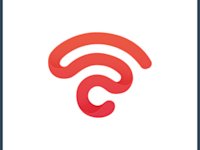Is Public WiFi Safe? The Hard Truth
The rise of cybercrime around the world is making people more sensitive to the topic of cybersecurity. This article will provide the definite answer to the question, “Is public WiFi safe?”. You might not like the answer, but this is the truth you must acknowledge.
While public Wi-Fi networks can become secure, part of the responsibility to avoid issues is down to the user. Therefore, business owners and internet providers should do their best to make the connection safe.
In the article, you will find everything you need to know about common cyber attacks and threats. Plus, there are actionable and effective guidelines to make an internet connection safe. In other words, whether you are the user or the WiFi owner, this article will spare you many troubles.
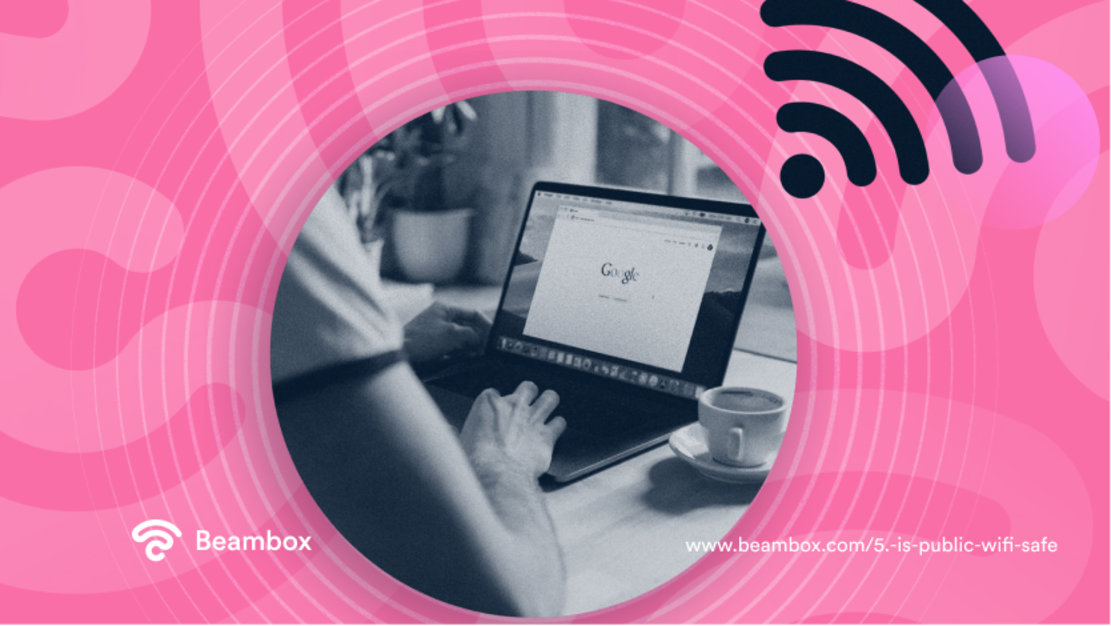
What Is the Danger of Using Public Wi-Fi Connections?
To start this article, let’s discuss what is the danger of using public Wi-Fi connections.
Wi-Fi connections pose security risks as anyone can access them. Unfortunately, this includes not only users who want to mind their businesses but also malicious actors and cybercriminals.
Whether private or public, an unsecured network carries risks and threats for its users. However, public Wi-Fi hotspots are more attractive to hackers because it increases the chances of gathering useful data.
The danger of using public wifi is not only related to data but also to privacy. Hackers want different types of data for different purposes. You will learn about this soon.
So is public wifi safe? Here’s the main takeaway. a public WiFi connection is generally less secure than a private one because hackers have incentives to target it. Nonetheless, a business owner can secure guest internet connections. Likewise, users can mitigate the risks by adopting simple practices.
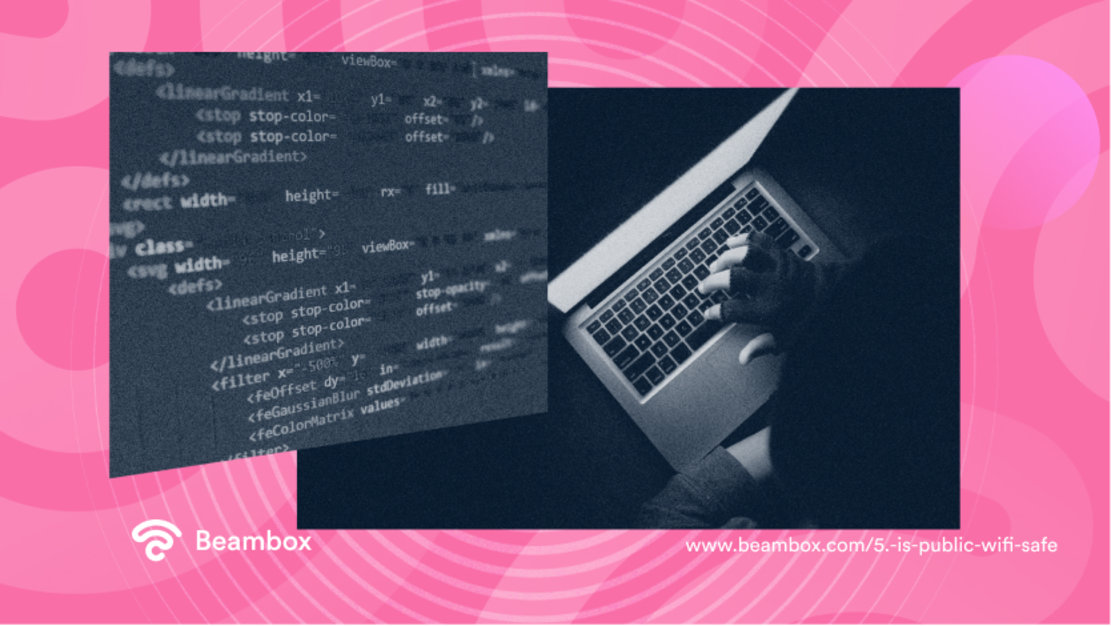
Is Public WiFi Safe? What Data Hackers Want
To clarify whether public WiFi is safe, it is necessary to understand what kind of data hackers want. In short, they want anything that can result in a profit.
The most targeted and useful data hackers want are usernames and passwords. These are the keys to anyone’s digital life and grant access to various platforms. When cybercriminals gather this data, they can use it for malicious activities or sell it on the dark web.
Your financial details are desirable data too. Credit card information, banking details, and similar data can transfer money directly into their pocket. If a hacker intercepts data while you’re making an online purchase or checking your bank balance, they’re hitting the jackpot.
Another type of useful data is personal identification. For example, your full name, address, phone number, email, etc. This information can help perform various social engineering attacks where a hacker impersonates a subject to carry out scams. This data also opens the door to aggressive phishing attacks.
The desire for such valuable information drives hackers to exploit the vulnerabilities of public WiFi networks. Let’s now see the most common type of cyber attacks.
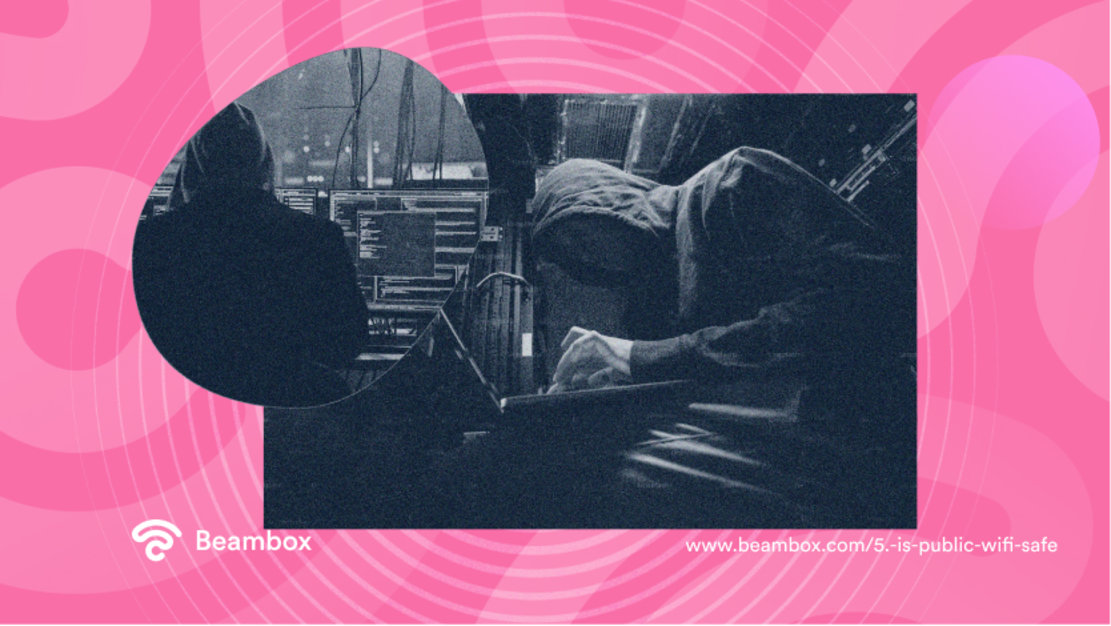
Is Public WiFi Safe? The Most Common Type of Cyber Attacks
When discussing whether public WiFi is safe, it’s imperative to understand the types of attacks cybercrimes can perform.
As mentioned, malicious actors can use data directly or utilize it in social engineering attacks.
-
Man in the Middle Attacks: This is the most common type of attack. It occurs when a malicious entity intercepts the data transferred between two parties. For example, a user transfers data through a guest WiFi network. Here the attacker can intercept sensitive data like passwords or financial details.
-
Network Spoofing: Here, a hacker sets up a fraudulent WiFi network that mimics a legitimate one. An unsuspecting user might connect to this network, thinking it’s the public WiFi of their café or hotel. This grants the hacker access to all data transmitted over their bogus network.
-
Evil Twin Attacks: This is a specific type of network spoofing attack. Here, the fraudulent network mimics the name of a legitimate network and its captive portal. It is common in the banking system where hackers want to log data and passwords to conduct financial transactions.
-
Malware Distribution: Unsecured guest WiFi might be a vessel for spreading malware or ransomware attacks. Potentially, malware can spread to all the devices connected to a network.
-
Packet Sniffing: This technique is similar to the man in the middle one. However, it is more precise as it analyzes data packets to find valuable ones. Then, a hacker can conduct a more specific and effective attack.
-
Rogue Access Point: This attack involves a hacker setting up a seemingly legitimate access point that users can connect to. Once a user connects, a hacker can simply intercept and collect the relevant data.
As you can see, defining whether public WiFi is safe must consider these threats. However, by using the right tools, you can do wonders. Let’s talk about VPNs.
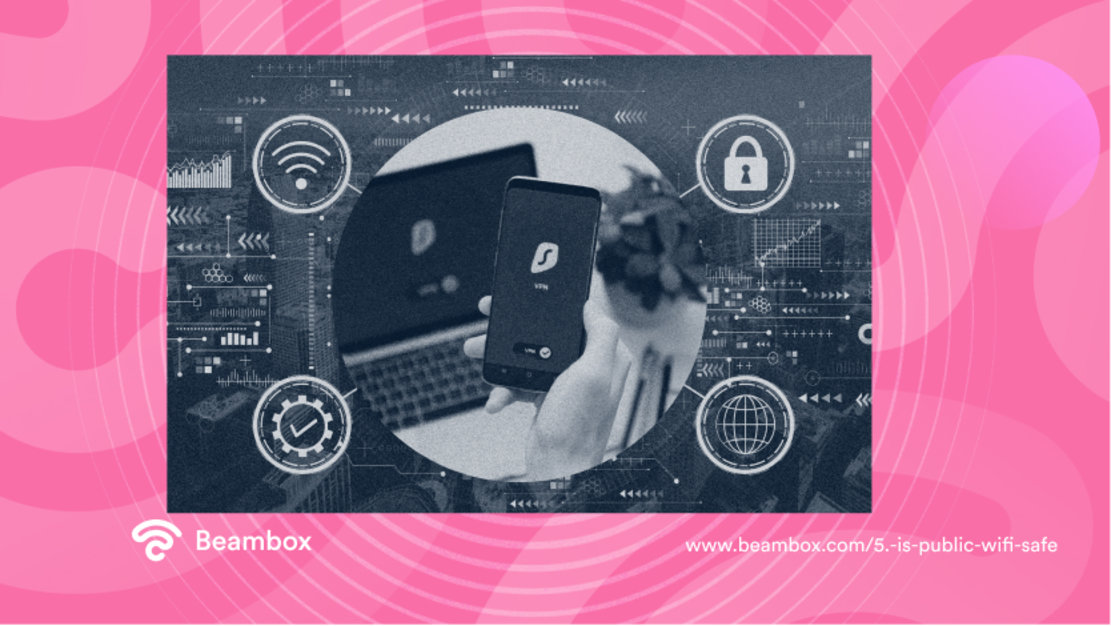
Is It Safe To Use Public WiFi With VPN? The Right Tool for the Job
Is public WiFi safe with a VPN? In a way, yes, it’s safer. A VPN, short for Virtual Private Network, is one of the most effective security tools when using public WiFi.
A VPN essentially creates a private tunnel between your device and the internet, encrypting all data that passes through. As a result, a hacker can only intercept encrypted data. Most of the common attacks will then be useless.
VPNs also mask your IP address which can further help to protect your identity online. It does it by routing your internet connection through servers located in different parts of the world. As a result, VPN services make it harder to track your online activities.
At this point, you might wonder if it is safe to use public WiFi with a VPN. The truth is that while VPNs greatly enhance online security and privacy, they are not a silver bullet. You must still exercise caution. If you log in with your credential on a fake customized splash page, a VPN won’t save you.
Therefore, along with the right tools, you must equip yourself with knowledge. Before going into the best practices, let’s give examples of how attacks work and what is at stake.
Is Public WiFi Safe? Examining the Most Common Scenario
As mentioned, cyberattacks can occur in any context where people connect to public WiFi. Whether you’re checking your emails at a café or making an online purchase at a hotel, the question remains. Is public WiFi safe in these situations?
In the following sections, we’ll delve into three common scenarios where public WiFi is frequently used: banking, hotels, and cafés. The goal is not to instill fear but to make you aware of what might happen.
Remember, staying safe on public WiFi is a shared responsibility between providers and users. The more informed you are, the better you can protect your information.
Is It Safe To Use Public WiFi for Banking? Hackers Want Your Money
Is it safe to use public WiFi for banking?
Probably not. As should be clear by now, when using public wifi, you transmit data over a network open to anyone. Public WiFi networks typically lack the level of encryption and security found in private networks. Hackers can control your banking account by using the tactics and attacks mentioned before. Sounds good (for them) right?
As a user, you have no real clue whether the network meets the requirement for security. Therefore, using public WiFi might not be the best idea for banking operations.
If you must use public WiFi for banking, follow the guidelines provided at the end of the article.
As you’ve seen, using a public Internet connection for banking is not optimal. Is, instead, public WiFi safe in a hotel?
Is It Safe To Use Unsecured WiFi in Hotels? Don’t Get Too Comfortable
Another common question is whether using unsecured WiFi in hotels is safe.
As the word unsecured should suggest, it is not very safe. However, it depends on how you use it.
Guests use hotel WiFi for various activities, from checking work emails to sharing vacation photos or booking their next flight. Hotel WiFi networks typically serve many users who might not be aware of what data they share with the network. Therefore, hackers have all the interest in targeting them.
Attackers can exploit these vulnerabilities by setting up bogus networks to trick unaware guests. However, more sophisticated attacks exist. If you connect to such a network, you share data related to your device. Then, hackers may target you with phishing attacks.
They will send you seemingly legitimate emails or messages requesting sensitive information or directing you to malicious websites. These tactics can be very convincing and effective. Thus, beware of them.
While hotels are responsible for providing secure WiFi networks for their guests, users also play a role in their security. You can always ask the hotel you’re staying at, “Is public WiFi safe at your business?” Then, ask them for further information.
Is Public WiFi Safe in Cafes? When a Coffee Can Cost You More Than You Think
Regarding public WiFi safety, cafés present their own unique set of risks. So, if you are wondering, “Is public WiFi safe in cafes?” the answer is, “Probably not.”
You don’t know what effort the owner made to secure them. Given the high volume of people using their WiFi, it is difficult for café owners to ensure high security standards.
The most common attacks targets for these settings target personal data to reuse for socially engineered attacks. For example, a hacker might get access to your cloud account, download the pictures, and run catfishing attack on Tinder.
So, is public WiFi safe in cafés? The answer depends on both the security measures implemented by the café and the precautions taken by you, the user.
Let’s now explore the simplest yet most effective practices you can apply to protect yourself from most attacks.
Is Public WiFi Safe? Best Practices To Make It Secure for Users and Providers
To ensure the safety of public WiFi usage, both the users and the providers have to play their part. Is public WiFi safe if you apply these practices? Yes. For most attacks. However, as security experts always suggest, keep yourself updated. This is an evolving field; therefore, knowledge is key.
Here are the best practices for users:
-
Use a VPN: As mentioned before, a VPN encrypts your data and shields your activities from potential snoopers.
-
Check the Website: Look for ‘https’ at the beginning of the web address. The ‘s’ stands for secure, meaning you will transmit encrypted data.
-
Check the Network: Ensure you are connecting to the right network before connecting.
-
Use Two-Factor Authentication (2FA): 2FA adds a layer of security by requiring two forms of verification for using a service. For example, a password and a code received by SMS.
And now, the best practices for business owners who provide free WiFi:
-
Create a Guest Network: Separate your business operations from the public WiFi by setting up a guest network. Even if the public network is under attack, your business data remains safe.
-
Change Password Frequently: Regularly changing the WiFi password helps protect against unauthorized access.
-
Give Access to Paying Customers Only: This will reduce the number of people accessing the network. Thus, you’ll reduce the attack surface.
-
Consider Installing a Firewall: Firewalls monitor network traffic based on predetermined security rules.
-
Write Clear WiFi Terms and Conditions: Guest WiFi conditions clarify how to use the service. Also, they delineate the scope of your responsibilities and spare you headaches.
If you are looking for a WiFi marketing solution that keeps your network secure with a few clicks, check out Beambox Plus, you will be able to automate your marketing initiatives and boost the growth of your venue. Start your trial today!
Get Started With Free WiFi Marketing
Beambox helps businesses like yours grow with data capture, marketing automation and reputation management.
Sign up for 30 days free
